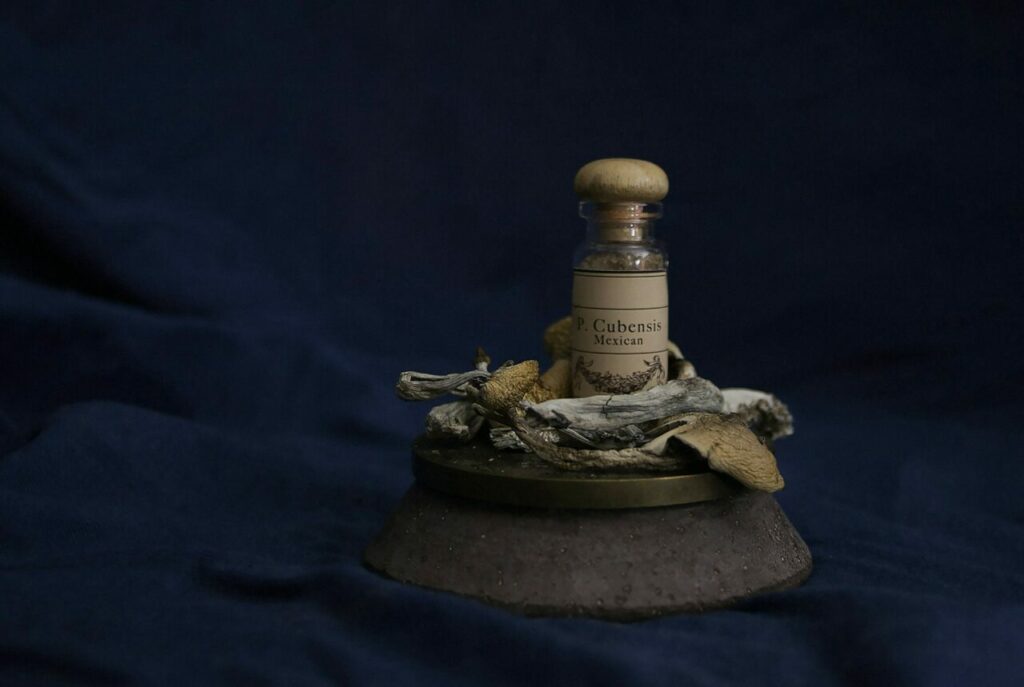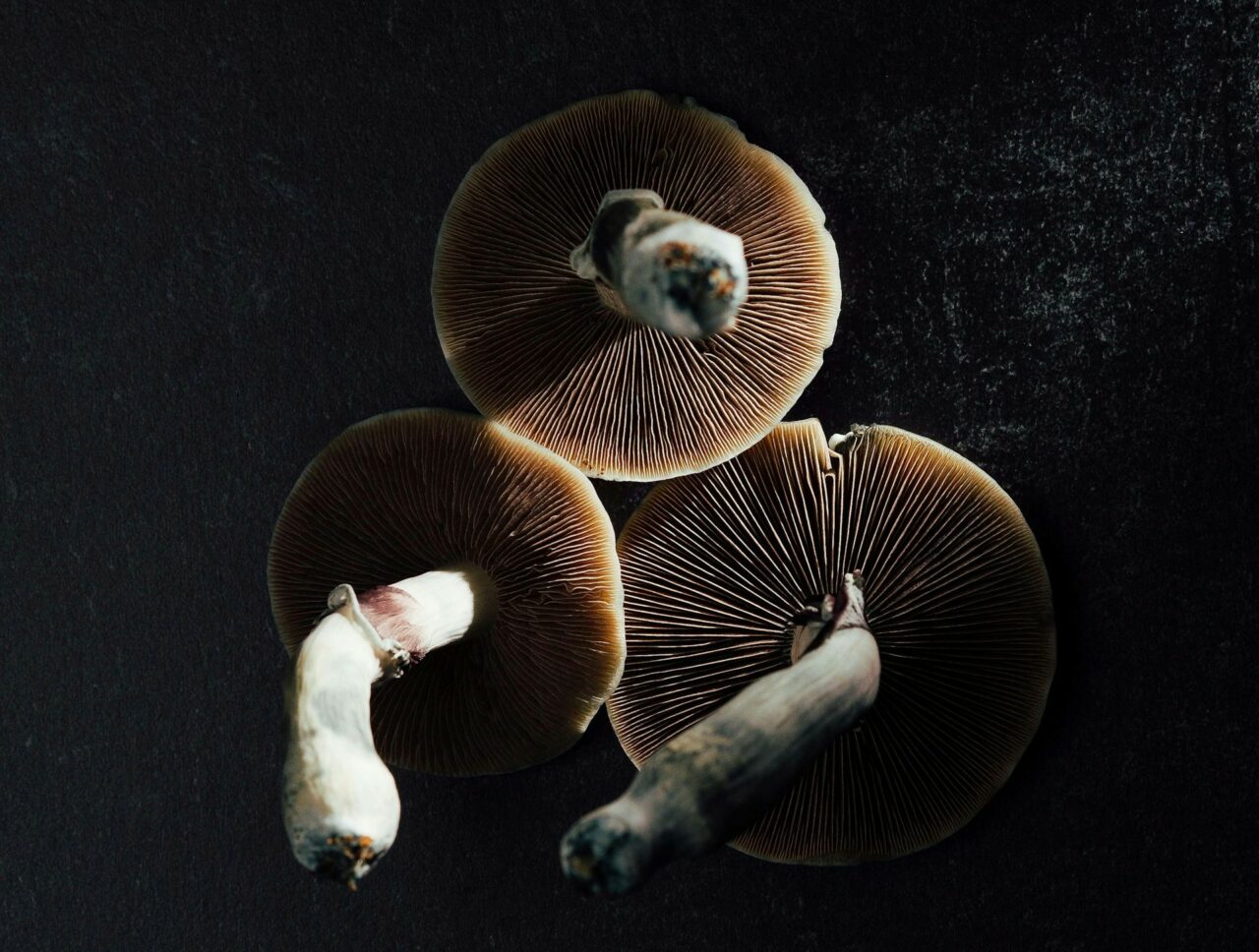As the appeal for natural magic mushrooms in Canada increases, the demand for lab-created psilocybin products has simultaneously escalated. Their guaranteed dosage makes these products a favorite among researchers. Nevertheless, they might not be aware that natural mushrooms can possess greater potency than their pharmaceutical counterparts. Experts have underlined considerable differences between the two, including disparities in strength.

Key Takeaways:
- More than 180 species of natural mushrooms provide varying degrees of potency, with effects shaped by the species, consumption method, cultivation process, and individual tolerance.
- Synthetic psilocybin, a lab-synthesized version of the natural compound, is made in regulated environments to guarantee uniformity and purity for clinical research, particularly in mental health therapies.
- The combined effects of various compounds in psychedelic mushrooms, such as psilocin and baeocystin, can lead to a deeper and more profound experience than a single compound alone.
Emerging Market: Psychedelics in Multiple Forms
The demand for psilocybin mushrooms in Canada is swiftly on the rise, particularly for addressing specific mental health issues like OCD, depression, PTSD, and anxiety. In reaction to this growing interest, provincial governments are starting to contemplate decriminalizing its recreational use.
In 2020, Canada sanctioned the restricted medical use of these mushrooms under specific conditions. A year later, the federal government permitted certain terminally ill patients to utilize these substances to help manage their symptoms.
The advancement of these policies has given rise to the development of synthetic psychedelics.
The Ongoing Debate
The persistent discussion about natural versus lab-made psychedelics revolves around matters of safety, accessibility, and cost.
Many contend that natural psychedelics provide a more comprehensive and traditional experience. Conversely, supporters of lab-made alternatives emphasize their ease of standardization for medical purposes, along with guaranteed dosage control and quality assurance.
While lab-synthesized psychoactive substances could enhance availability, worries remain about potential drug monopolization. Critics propose this could lead to less
Increased costs and challenges in accessibility for users persist.
A Comprehensive Look at Psilocybin
The psychedelic substance, Psilocybe cubensis, commonly referred to as magic mushroom, is one among many naturally occurring psychedelic substances accessible today. Magic mushrooms with their distinct psychoactive properties come in diverse strains. These include Golden Teachers, Amazonian Cubensis, Blue Meanies, and others, with Psilocybe cubensis being the most widely recognized family.
The Psychedelic Process Explained
Psilocin, a compound derived from this mushroom, transforms into another chemical when metabolized by the liver. This new compound interacts with the brain’s serotonin receptors, specifically the 5-HT2A receptor.
The 5-HT2A receptor is instrumental in governing mood, cognitive functions, and perception. When this receptor interacts with the newly formed compound, the usual functioning of serotonin pathways is modified, leading to changes in visual and auditory perception, thought patterns, and emotional states. This leads to enhanced mood, improved creativity, introspection, and the characteristic “psychedelic” experiences.
Two Main Categories
| Natural | Found in over 180 species of fungi, the potency varies depending on the type of mushroom. Psilocybe cubensis is a prevalent variety. The effects can vary based on modes of consumption, cultivation practices, and individual tolerance levels. |
| Synthetic | Manufactured in labs and chemically identical to natural compounds. These are synthesized in controlled settings to maintain consistency and purity. They are increasingly being researched for their potential clinical uses, particularly in the realm of mental health treatments. |
A Comparison: Nature’s Offering vs. Laboratory Creation
Natural versions of these substances can be found in certain magic mushroom species. Indigenous communities in North and South America have traditionally employed these mushrooms in their rituals and ceremonies, viewing them as sacred or divine entities.
- Derived from plants and mushrooms
- Utilized in ancient rituals and medicinal practices
- The potency of each strain is determined by its unique genetic composition
On the other hand, synthetic drugs are
A synthetic drug imitates the natural chemical structure of a certain compound with remarkable precision. Expertly synthesized by pharmaceutical specialists in controlled settings, these drugs are designed to function in a way similar to natural drugs. However, they carry the potential to alter the overall psychedelic experience.
- Fabricated by trained experts in the pharmaceutical field
- Newly developed with a focus on medicinal applications
- Consistent potency owing to the regulated production process
Natural substances bring additional benefits as a result of their bioactive compounds. Various mushroom types can have different concentrations of psilocybin and other compounds, leading to a range of effects.
Researcher Insights
A research project at Hebrew University found that psychedelic mushrooms exert a more potent and long-lasting influence on synaptic plasticity than their synthetic counterparts. The research group studied how the drug affected the brain activity of mice, examining alterations in behaviour and specific brain chemicals.
The study discovered that the extract reduced head twitches and promoted the formation of new neural connections, suggesting that mushroom extract could offer more advantages than a single compound.
The researchers also brought into focus the “entourage effect”, which they described as the combined effect of multiple compounds in psychedelic mushrooms that could be more potent than the influence of individual compounds. In the case of mushrooms, compounds like psilocin, baeocystin, and other tryptamines may synergise to evoke an intense experience.
These additional compounds are absent in lab-produced substances, which could result in slight differences in impact, even when the psychedelic content remains the same.
Expert Opinions on Nature’s Superiority
Research consistently shows that psilocybin, irrespective of its form, holds promising potential for treating a range of psychiatric disorders. A 2024 study examining the effects of controlled substances on patients with treatment-resistant depression reported symptom alleviation after administering magic mushrooms.
When combined with other treatments, organic psychedelics may stimulate more profound emotional processing and insights during therapy sessions, thereby enhancing long-term results.
Researchers from the same institution noted that hallucinogenic mushrooms increase synaptic plasticity. They possess a unique metabolic profile that affects oxidative stress and energy production pathways, unlike lab-synthesized psychedelics.
Potential Market Impact
The growing body of research on this subject may shape how Canadians perceive and purchase psychedelics. Health Canada’s preliminary programs, such as the Special Access Program, are demonstrating potential to pave the way for legalization and revolutionize the therapeutic landscape. Psilocybin-assisted therapy could soon become a leading treatment method.
As Canada progresses towards fully unlocking the potential of organic psychedelics, they are likely to play an increasingly vital role in clinical trials and therapeutic settings. This could lead to significant breakthroughs in mental health treatment.
How to Safely Acquire Shrooms in Canada
- Via Section 56 Exemption: Health Canada recognizes that patients with severe medical conditions may benefit from psilocybin as an alternative treatment. This exemption is part of the Controlled Drugs and Substances Act.
- Clinical Trials: Early-stage clinical trials are being conducted to investigate the potential of this drug in treating mental health disorders. Participants must meet certain requirements and pass a physician’s assessment.
- Online Purchase: Psilocybin capsules or edibles can be bought from online vendors in Canada, but it’s crucial to ensure you’re buying from reputable sources.
Unleashing the Power of Natural Compounds
Nature is abundant with miracles, and magic mushrooms are one such marvel. Instead of opting for synthetic psychedelics, consider the potent and therapeutic magic mushrooms native to Canada. Discover the best, naturally sourced shroom strains at Strongest Shroom Strain Canada.
The shrooms we have for sale not only meet the standard but exceed it by maintaining their purest and most authentic form in a dried state. Place your order today and receive your chosen items delivered discreetly and conveniently to your doorstep.
Frequently Asked Queries
What are baeocystin and norbaeocystin?
Both are tryptamine or indole alkaloids. They are chemically akin to psilocybin. These tryptamine derivatives act as secondary alkaloids in shrooms, contributing to the overall psychedelic experience, albeit to a lesser extent. Baeocystin and Norbaeocystin have similar chemical structures but differ in their psychoactive effects.
Are organic dried mushrooms included in capsules and edibles?
Experiences may vary depending on the source of the product. Online dispensaries offer products that are rich in organic substances, facilitating a comprehensive entourage effect. In contrast, synthetic compounds often found in capsules are typically utilized in clinical trials and medical clinics.
Do natural psychedelics yield more intense experiences?
It’s worth noting that expecting a deeper experience from natural psychedelics could indeed lead to that very result. Our expectations, which are part of the ‘set’, can direct the course of the journey. Natural psychedelics are frequently linked with ceremonial practices, and this ritualistic setting can result in uniquely fulfilling experiences. These experiences distinguish themselves from clinical sessions conducted with synthetic compounds in a number of ways.





